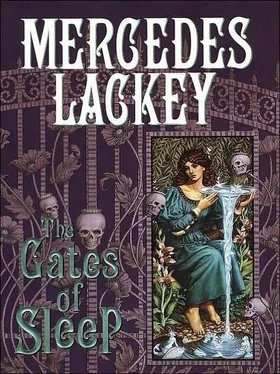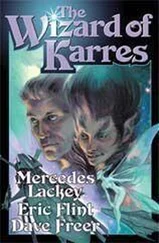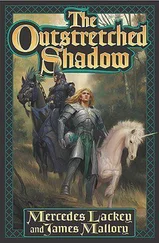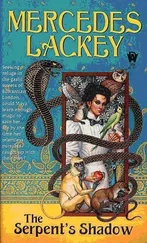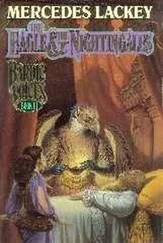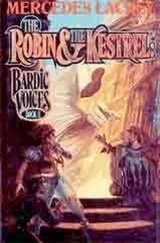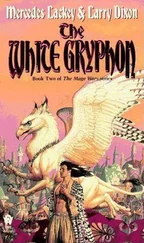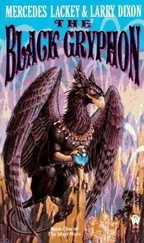Teatime came and went with no signs other than an increasing heaviness of spirit. Eleanor felt it too, though as was her wont, she said nothing; he read it in her wary eyes, and in the tense way she moved, glancing behind her often, as if expecting to find something dreadful following. When he saw that, he increased the strength of the shields yet again, and gave Eleanor orders to add sedatives to the medications of certain patients that evening.
“Ah,” she said. “For the storm—” but he knew, and she knew, that it was not the March thunderstorm she spoke of, though the flickers on the horizon as the sun sank behind its heavy gray veils and gray light deepened to blue warned of more than just a springtime’s shower.
When the storm broke, it brought no relief, only increased anxiety. The storm was a reflection of the tension in the air, not a means of releasing it. This was no ordinary storm; it crouched above Oakhurst like a fat, heavy spider and refused to budge, sending out lightning and thunder and torrents of rain.
By now, Andrew’s nerves were strung as tightly as they ever had been in his life, and he couldn’t eat dinner. He wondered if he ought to prescribe a sedative dose for himself.
But as he sat in his office-cum-study, watching the lightning arc through the clouds, and in the flashes, the rain sheeting down, he decided that he had better not. He should keep all his wits about him. If the blow fell, and he was needed, he could not afford to have his mind befogged.
Having once shattered a fragile teacup and once snapped the stem of a wineglass when feeling nervy, he had chosen a thick mug for his tea this evening. His hands closed around it and clutched it tightly enough to make his fingers ache, and had the pottery been less than a quarter-inch thick, he was certain it, too, would have given way under his grip. As well, perhaps, that he was no Fire Master—his nerves were stretched so tightly that if he had been, the least little startlement might have sent the contents of his office up in flames.
He stretched all of his senses to their utmost, searching through the night, questing for any clue, or any sign that something was about to fall on his head. It was dangerous, that—looking out past the shields that he had set up around the walls of Briareley. But he couldn’t just sit here anymore, waiting for the blow to fall—he had to do something, even if it was only to look! Every nerve in his body seemed acutely sensitive, and the muscles of his neck and shoulders were so tight and knotted they felt afire.
Suddenly, a bolt of lightning struck practically outside his study window—he jumped—and as the windows shook with the attendant peal of thunder, another sound reverberated through the halls.
The booming sound of someone frantically pounding on the door with the huge bronze knocker. Great blows echoed up and down the rooms, reverberated against high ceilings and shuddered in chimneys.
This was what he had been waiting for. Or if not—at least it was something happening at last—something he could act on instead of just waiting. The tension in him snapped, releasing him as a foxhound set on quarry.
He leapt to his feet, shoved back his chair, and headed for the door; ahead of him he saw Diccon hurrying to answer the summons, and poking from doorways and around corners were the heads of patients and attendants—curious, but with a hint of fear in their eyes.
The pounding continued; there was a frantic sound to it. Was there a medical emergency down in the village? But if there was, why come here rather than knocking up the village doctor?
Diccon hauled the huge door open, and a torrent of rain blew in, carrying with it two men wrapped in mackintoshes. The was no mistaking the second one, who raked the entrance hall with an imperious gaze and focused on Andrew.
“You! Doctor!” he barked. “You’re needed at Oakhurst! Miss Roeswood has collapsed!”
Andrew folded his stethoscope and tucked it into his pocket, using iron will to control face and voice. His heart hammered in his chest; his expression must give none of this away. They must not know, must not even guess, that he had ever seen Marina more than that once on the road, or all was lost.
“This young woman is in a coma,” he said flatly, looking not at poor Marina, so fragile and pale against the dark upholstery of the couch she had been laid on, but at the impassive visages of Madam Arachne and her son. Marina might have been some stranger with a sprained ankle for all that they were reacting. Oh, certainly the Odious Reggie had come dashing through the storm to drag him here—not that he’d needed dragging—but now that he was here, Reggie merely watched with ironic interest, as if he expected Pike to fail and was pleased to find his expectations fulfilled. And as for Madam—he’d seen women evidence more concern for a toad than she was showing for her own niece. In fact—she seemed amused at his efforts to revive Marina. There was some devilment here.
Was devilment the right word? If those wild surmises of his were true, it might well be…
But he could do nothing here. Especially not if his guesses were true. “She is completely unresponsive to stimuli, and I am baffled as to the cause of her state. It might be a stroke—or it could have some external cause. If she had been outside, I might even suspect lightning—”
There was a flash of interest at that. The woman seized on his possibly explanation so readily that even if he hadn’t suspected her of treachery, he’d have known something was wrong. “She was standing right beside that window when she collapsed,” Madam said, and her even and modulated tones somehow grated on his nerves in a way he found unbearable. “Could lightning have struck her through the window?”
“I don’t know. Was it open?” he asked, then shook his head. “Never mind. The cause doesn’t matter. This young woman needs professional treatment and care—”
This young woman needs to be out of here! he thought, his skin crawling at the sight of Madam’s bright, but curiously flat gaze as she regarded the body of her niece. The hair on the back of his neck literally stood up, and he had to restrain himself to keep from showing his teeth in a warning snarl. You are responsible for this, Madam. I don’t know how, but I know that you are responsible.
He had to control himself; he had to completely, absolutely, control himself. He daren’t let a hint of what he felt show.
And he had to say things he not only didn’t mean, but make suggestions he did not want followed. “—for tonight, it will be enough to put her to bed and hope for the best, but if she has not regained some signs of consciousness by tomorrow, you will need both a physician and trained nurses,” he continued, knowing that if he showed any signs of interest in Marina, Madam would find someone else. Devilment… she’ll want indifferent care at the best, and neglectful at the worst. I have to convince her that this is what I represent. And to do that, I have to pretend I don’t care about having her as a patient. “A physician to check on her welfare and try methods of bringing her awake, and nurses to care for her physical needs. She will need to be tube-fed, cleaned, turned—”
“What about you?” Reggie interrupted, his eyes shrewd. “What about your people? You’re not that far away, why can’t you come tend her here?”
“We have a full schedule at Briareley,” he replied, feigning indifference, though his heart urged him to snatch Marina up, throw her over his shoulder, and run for the carriage with her. “I cannot spare any of my nurses, nor can I afford to take the time away from my own patients to—”
Читать дальше
